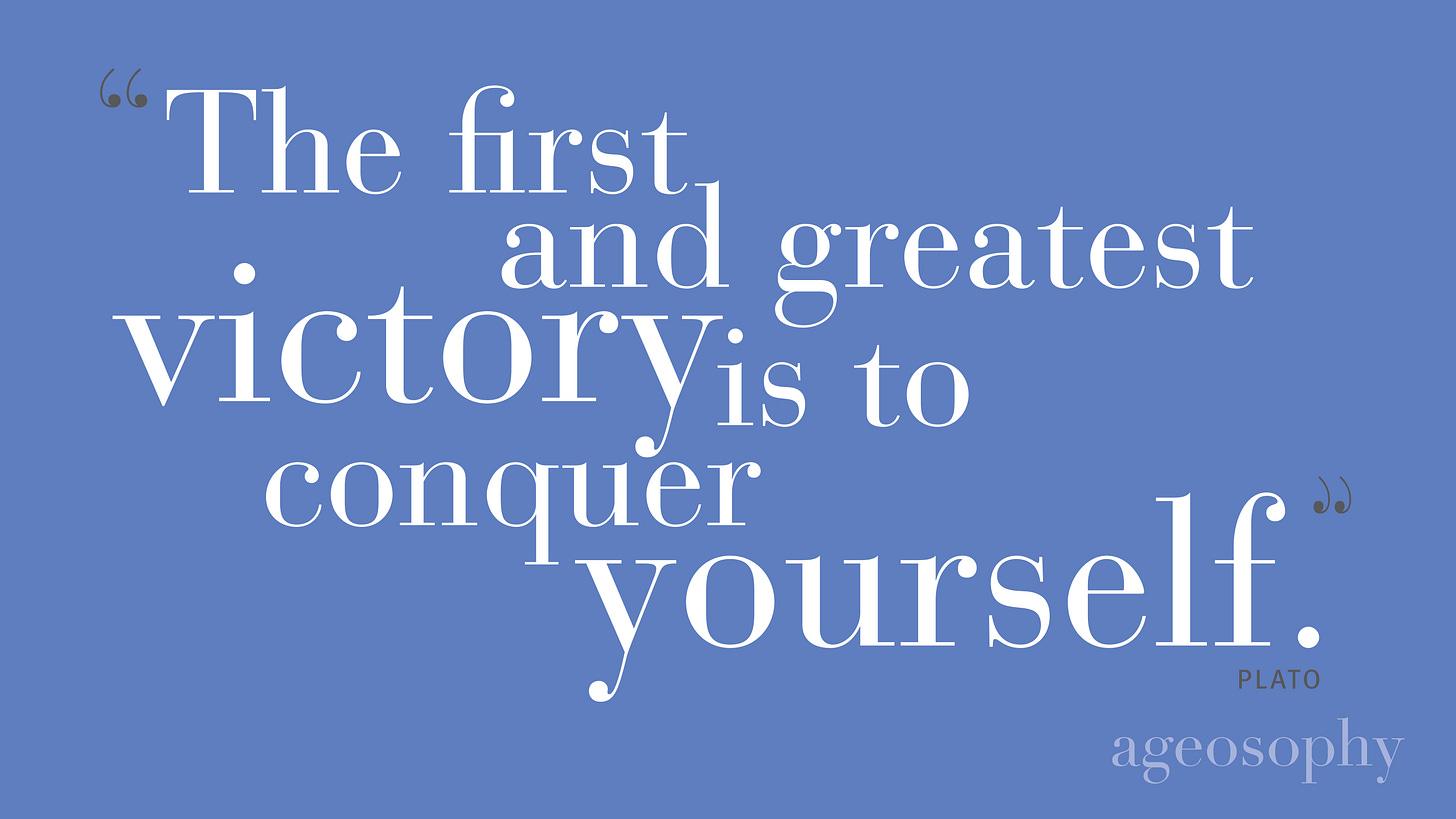Recently a friend suggested I post recipes on Ageosophy, which is a natural considering how much I enjoy cooking and baking. In fact, I’ve long had a fascination with reading recipes (I find it oddly relaxing), and one of my favorite spots in our kitchen is the wall of cookbooks I’ve collected over three decades. So, I mentally ran through what I eat every week to think of what recipes I could share… only to realize that my eating habits would probably bore people to tears. The next moment I had a snapshot memory of my Dad having a bowl of cereal for dinner. No complaints. Head down, eating his cereal.
My dad was a fascinating study in restraint. He was born in the tiny mining town of Bisbee, Arizona in 1910 and somehow made his way to Stanford University in the late 1920s to get his master's in metallurgical engineering. To supplement tuition, he humbly cleaned the chancellor’s home every week. He went on to work in his field of study and later to have a career in the armed services. When I was one year old, he retired from the Army as a Lt. Colonel. He was very much the old-style military man. I vividly recall his Saturday morning cleaning lessons (no cartoons in my house!) on how to vacuum leaving perfectly uniform, orderly tracks—a holdover from college days. Living through the depression and trained by military service, when it came to food he simply ate what was put in front of him. Even when my mom was short on time and served him cereal.
Epiphany 5: Embrace Simplicity
I’m realizing his austerity took root in me and has become more pronounced as the years go by. Now, I’m grateful for what I once thought was a bit of an oddity — and I believe it is actually serving me well. In my ongoing quest to eliminate fake foods and questionable ingredients from my diet, I’ve managed to become content with simplicity: clean, uncomplicated food…much like my dad with his cereal.
This comes by design. To move away from heavily processed food, you have to prepare most meals, which admittedly can be time-consuming. My strategy has been to adopt a very straightforward approach: simple ingredients, simply prepared. For instance, a typical lunch may be bone broth miso soup with sliced mushrooms and scallions (I use one cup of broth with a spoonful of miso paste) and a simple coleslaw with apple cider vinegar and avocado oil dressing. I know that may sound more complicated than microwaving a cup of noodles, but in under 10 minutes, I have an infinitely more nourishing meal.
Embracing simplicity is one part mindset and one part practical adaption. I’ve got a future post planned on easy switches, but oddly enough, simple first starts in the mind. Once you reframe your expectations, it becomes more attainable.
Epiphany 6: Consuming isn’t limited to food
A critical element to mindset is what we feed our minds. When our son was born, my husband and I wanted to eliminate the influence of advertising on him as he grew up, so we decided there would be no conventional TV/cable shows in the house. No cartoons or shows created to sell cereal and toys. As a family, we would not mindlessly consume marketing. What started as a desire to limit our son’s exposure to non-stop merchandising has spilled over to other aspects of our lives. I rarely read magazines anymore. I don’t endlessly surf the net. Advertising doesn’t surround me.
It’s been nearly 16 years since we made that decision, and as I was rolling this article around in my head, it dawned on me what a profound impact it has had on our lives. We are not sheeplike “programmed consumers.” I feel no temptation to try any newfangled, highly processed food product because I don’t even know what they are! The $1.06 billion spent by the food industry to entice people of all ages is lost on me. Rather, I’m a targeted, perimeter shopper and I don’t lallygag in the middle aisles where most of the engineered-to-be-highly-addictive highly processed foods reside. Nor do I feel the need to try the latest fast-food iteration of a blooming onion.
Eliminating negative influences will decrease temptations, and selecting nutritious options will become much easier. Surround yourself with positive, healthy inspiration in what you read and view and in the company you keep. You have the power to govern and guide your consumption.
Epiphany 7: Variety and balance
Undoubtedly you’ve come across the recommendations to eat the rainbow: dark leafy greens and richly pigmented fruits. Hand-in-glove with those recommendations is the litany of confusing and conflicting advice about grains/no grains; vegetables/no vegetables; all meat,/no meat. It’s enough to make your head spin! But, after copious amounts of reading and listening to a wide array of experts on nutrition and health, there are two concepts that have resonated most with me: variety and balance.
For me, two facts augment the importance of variety and balance. First, there are many nutrients that our bodies don’t make, but that we nonetheless need to maintain optimal functioning. These come through food. For instance, while our bodies need 20 different amino acids to function properly, the “9 essential amino acids” must be consumed through food…a wide variety of foods. There are also essential vitamins and minerals required—such as vitamin C—that our bodies don’t produce on their own and can only be gotten through food or supplements.
Second is the mind-boggling universe of gut microbiota. Researchers are still endeavoring to thoroughly understand this complex ecosystem with 300-500 species compromising of nearly 2 million microbiomes commonly found in the average person’s gut. That’s staggering. I can’t even wrap my mind around that! It gets even more complicated when you realize there are good and bad bacteria that are meant to be in harmony with one another. Food is our primary source to keep this intricate ecosystem happy, and it only stands to reason we need a broad and balanced diet to do so.
I tend to get stuck in ruts, so one thing that helps me is to make a list of foods I enjoy from the nutrition resources outlined in Eating Epiphanies, Part 1 to remind myself to strike a balance and cast a broad net. Give it a try if you tend to fall into ruts as well.
Epiphany 8: Every system is connected
Speaking of the gut microbiota…there is a well-established connection between the brain and the gut. Indeed, the gut has been dubbed the “second brain” because of its impact on digestion, mood, and possibly thinking skills and memory. The state of our gut affects our overall health: immunity, metabolic health, and brain health. But it doesn’t stop at the gut. The unfathomably complex systems in our bodies are inextricably interconnected and interdependent. And as we know from epigenetics, everything we consume has an effect on our genes.
We don’t need to study all the systems and connections to fully understand how they work. What’s important is that we grasp the critical role that good nutrition and clean ingredients play in maintaining health and longevity.
Epiphany 9: Time is an investment
I was grumbling to myself the other day about how I feel like all I do is cook and clean up. Then the gratitude reflex kicked in, reminding me to be grateful that I’m able to prepare nutritious food and have lovely cookware to wash. (I’m not kidding, that’s what my little voice said to me.) This illuminated the most likely obstacle for many people: the time and mental energy it takes to prepare nutritious food and clean up afterward… I understand well with busy lives, what a challenge that can be.
Ultimately, it comes down to recognizing that time is our most precious commodity. Just as I’m intentional about what I eat, I am intentional about how I invest my time and that it’s well spent. For instance, I don’t have many leisurely distractions during the day. I’m not on social media, and the TV is not on until later in the evening when I’m on my way to bed. This frees me to focus on activities that will help me achieve not just a long lifespan, my true goal of a long healthspan.
Habit: 90/10 rule
By now you may be thinking I’m a big killjoy when it comes to food. Not so. My husband and I have long had the tradition of no holds barred, splurge meals twice a week. Without knowing it, we were following the 90/10 rule—90% of the time we eat what we should, 10% of the time we throw caution to the wind...as much as I am capable of…it’s what makes the 90% possible.
Does all of this sometimes require a level of self-discipline that my military father would appreciate? Sure. But some goals are simply worth the effort.














Thank you, I have a lot planned, so keep an eye out!
Great insight, Camy‼️ Looking forward to more; keep 'em coming‼️